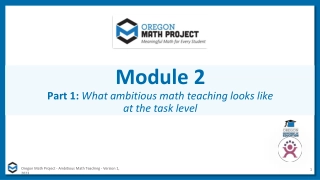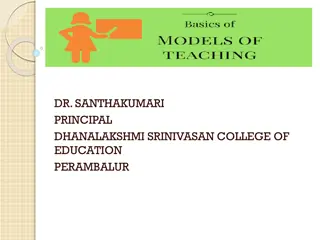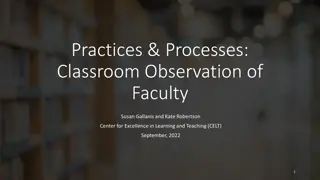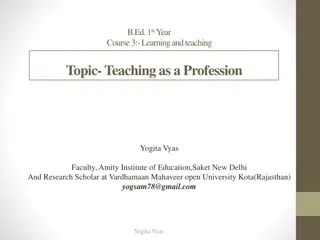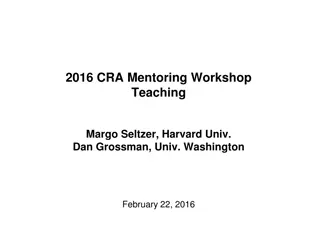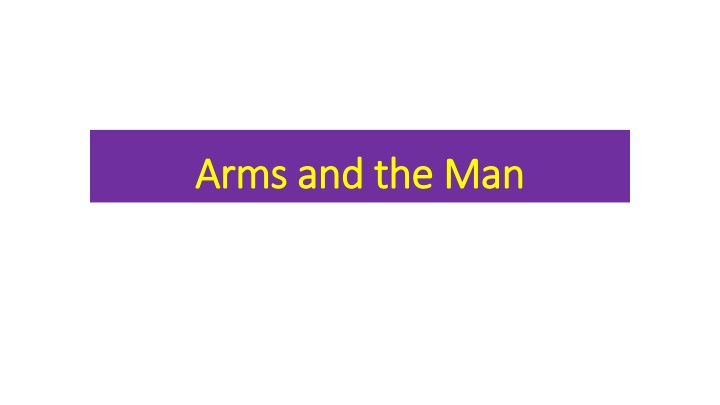
Arms and the Man: A Theatrical Masterpiece Exploring Heroism and National Identity
"Discover the historical backdrop and thematic essence of George Bernard Shaw's play "Arms and the Man". Set during the Bulgarian-Serbian War, the play delves into the complexities of heroism, virtue, and national dignity, contrasting romantic ideals with practical human behavior. Explore the significance of the title taken from Dryden's translation of Virgil's Aeneid, and delve into the examination of societal norms and military customs prevalent in the late 19th century."
Download Presentation

Please find below an Image/Link to download the presentation.
The content on the website is provided AS IS for your information and personal use only. It may not be sold, licensed, or shared on other websites without obtaining consent from the author. If you encounter any issues during the download, it is possible that the publisher has removed the file from their server.
You are allowed to download the files provided on this website for personal or commercial use, subject to the condition that they are used lawfully. All files are the property of their respective owners.
The content on the website is provided AS IS for your information and personal use only. It may not be sold, licensed, or shared on other websites without obtaining consent from the author.
E N D
Presentation Transcript
Arms and the Man Arms and the Man
The Title of the Play The Title of the Play Arms and the Man, is taken from the opening line of Dryden s translation of Virgil s epic, the Aeneid. Dryden translates Virgil s Arma virumque cano as Arms, and the man I sing . Virgil's poem concerns heroism, public virtue, and the origins of the Roman Empire. Shaw s play, set in the early days of a new nation, Bulgaria, attempts to distinguish between true and false concepts of heroism, virtue, honour, and national dignity. It shows the difference between pretentious, romantic ideals and workable human behaviour. It contrasts the reality of modern life with false literary portrayals of how people are supposed to conduct themselves.
The Title of the Play The Title of the Play Arms and the Man, is taken from the opening line of Dryden s translation of Virgil s epic, the Aeneid. Dryden translates Virgil s Arma virumque cano as Arms, and the man I sing . Virgil's poem concerns heroism, public virtue, and the origins of the Roman Empire. Shaw s play, set in the early days of a new nation, Bulgaria, attempts to distinguish between true and false concepts of heroism, virtue, honour, and national dignity. It shows the difference between pretentious, romantic ideals and workable human behaviour. It contrasts the reality of modern life with false literary portrayals of how people are supposed to conduct themselves.
The Historical Setting: The Historical Setting: The Bulgarian The Bulgarian- -Serbian War Serbian War The Ottoman, or Turkish, Empire controlled the Balkans from the fourteenth century until the mid-nineteenth century, when Serbia (now became a part of Yugoslavia) became independent. In 1876 Bulgaria rebelled against the Turks and lost. The Russians declared war on the Turks in 1877 and in 1878 Bulgaria became an independent nation as a result of the Russo-Turkish War. In 1885 Eastern Rumelia, in the southern part of Bulgaria, revolted against Turkish rule and became united with Bulgaria. As a result Serbia invaded Bulgaria and in four days conquered a large part of the country. The Bulgarians, led by Prince Alexander, fought back and with Russian aid made the Serbians retreat to Pirot, in Serbia, at which point the Austrians threatened to enter the war as Serbian allies.
The Historical Setting: The Historical Setting: The Bulgarian The Bulgarian- -Serbian War Serbian War Arms and the Man begins with the turning point of the war when the Serbians had advanced across the Dragoman Pass to Slivnitza in Bulgaria, where they lost a major battle on 17 November 1885. The second and third acts occur three days after the Treaty of Bucharest where, under Austrian pressure, a peace treaty was signed in which the Bulgarians had to return conquered Serbian territory. During the 1885 war the Serbs were led by Austrian officers, while the Bulgarians were led by Russians. Until the nineteenth century most wars were fought by mercenary professional soldiers and the practice still continued in the Balkans at this time. Switzerland had a long reputation for professional soldiers who would fight as mercenaries in any country, like Captain Bluntschli in Arms and the Man.
Setting Time & Place Setting Time & Place Night. A lady s bedchamber in Bulgaria, in a small town near the Dragoman Pass. It is late in November in the year 1885, and through an open window with a little balcony on the left can be seen a peak of the Balkans, wonderfully white and beautiful in the starlit snow.
Rainas Bedroom Raina s Bedroom The interior of the room is not like anything to be seen in the east of Europe. It is half rich Bulgarian, half cheap Viennese. The counterpane and hangings of the bed, the window curtains, the little carpet, and all the ornamental textile fabrics in the room are oriental and gorgeous: the paper on the walls is occidental and paltry.
Page 2 Page 2 Conspicuous Consumption: She is covered by a long mantle of furs, worth, on a moderate estimate, about three times the furniture of her room.
Page 3 Page 3 LOUKA. If you please, madam .. [She goes out on the balcony and pulls the outside shutters to; then steps back into the room]. CATHERINE. [business like, her housekeeping instincts aroused]. I must see that everything is made safe downstairs. RAINA. I wish our people were not so cruel. What glory is there in killing wretched fugitives? CATHERINE. Cruel! Do you suppose they would hesitate to kill you or worse?
Silhouete Silhouete
Man vs. Man vs. Raina p.6 p.6 Raina MAN (crossing swiftly to the ottoman and snatching the cloak). A good idea! No: I ll keep the cloak; and you will take care that nobody comes in and sees you without it. This is a better weapon than the revolver. (He throws the pistol down on the ottoman.) RAINA [revolted]. It is not the weapon of a gentleman! MAN. It s good enough for a man with only you to stand between him and death. (As they look at one another for a moment, Raina hardly able to believe that even a Servian officer can be so cynically and selfishly unchivalrous, they are startled by a sharp fusillade in the street.The chill of imminent death hushes the man s voice as he adds)
Man vs Raina Man vs Raina p.6 p.6 MAN (grimly). Never mind. Keep out of the way. It will not last long. RAINA (impulsively). I ll help you. Hide yourself, oh, hide yourself, quick, behind the curtain. (She seizes him by a torn strip of his sleeve, and pulls him towards the window.) Raina hides her own enemy
Man vs Raina Man vs Raina P. 6 P. 6 - - 7 7 MAN (yielding to her). There is just half a chance, if you keep your head. Remember: nine soldiers out of ten are born fools. (He hides behind the curtain, looking out for a moment to say, finally) If they find me, I promise you a fight a devil of a fight! (He disappears. Raina takes of the cloak and throws it across the foot of the bed. Then with a sleepy, disturbed air, she opens the door. Louka enters excitedly.) LOUKA. A man has been seen climbing up the water pipe to your balcony a Servian. The soldiers want to search for him; and they are so wild and drunk and furious. My lady says you are to dress at once.
Louka Louka P. 7 P. 7 RAINA.Don t leave my mother, Louka, whilst the soldiers are here. [1. Louka glances at Raina, 2.at the ottoman, 3.at the curtain; then purses her lips secretively, laughs to herself, and goes out. Raina, highly offended by this demonstration, follows her to the door, shuts it behind her with a slam, locking it violently. The man immediately steps out from behind the curtain, sheathing his sabre, and dismissing the danger from his mind in a businesslike way.]
Raina vs. Man Raina vs. Man P. 8 P. 8 RAINA (staring at him rather superciliously, conceiving a poorer and poorer opinion of him, and feels proportionately more and more at her ease with him). I am sorry I frightened you. (She takes up the pistol and hands it to him.) Pray take it to protect yourself against me. MAN (grinning wearily at the sarcasm as he takes the pistol). No use, dear young lady: there s nothing in it. It s not loaded. (He makes a grimace at it, and drops it disparagingly into his revolver case.)
Raina vs. Man Raina vs. Man P. 8 P. 8 RAINA. Load it by all means. MAN. I ve no ammunition. What use are cartridges in battle? I always carry chocolate instead; and I finished the last cake of that yesterday. RAINA (outraged in her most cherished ideals of manhood). Chocolate! Do you stuff your pockets with sweets like a schoolboy even in the field?
Raina vs. Man Raina vs. Man P. 9 P. 9 MAN(ravenously). You re an angel! (He gobbles the comfits.) Creams! Delicious! (He looks anxiously to see whether there are any more. There are none. He accepts the inevitable with pathetic goodhumor, and says, with grateful emotion) Bless you, dear lady. You can always tell an old soldier by the inside of his holsters and cartridge boxes. The young ones carry pistols and cartridges; the old ones, grub. Thank you. (He hands back the box. She snatches it contemptuously from him and throws it away.He shies again, as if she had meant to strike him) Ugh! Don t do things so suddenly, gracious lady. It is mean revenge yourself because I frightened you just now.

